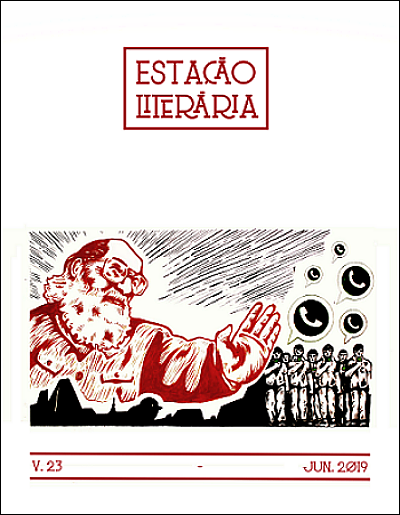The biblical parody of existential freedom in A paixão segundo G. H., by Clarice Lispector
DOI:
https://doi.org/10.5433/el.2019v23.e35708Keywords:
Intertextuality, Bible, Existentialism, Freedom.Abstract
The article analyzes the intertextual relations between Clarice Lispector's novel and the Bible. The theme of existential freedom emerges as G. H.'s dilemma arises when he is faced with the situation of having to ingest or not the cockroach he has killed. From this perspective, the work explores analogous situations in which the cockroach functions as a parodied symbol of the forbidden fruit of paradise. Thus, G. H. chooses to break with the moral prescriptions that classify the insect as forbidden and unclean food, and when she ingests the insect, she makes a revelation in her inner self. The article also dialogues with references that discuss intertextuality and existentialism.
Downloads
References
BIBLIA. Biblia Sacra: Iuxta Vulgatam Versionem. Stuttgart: Detsche Bibelgesellschaft, 1994.
BIHLMEYER, Karl; TUECHLE, Hermann. História da Igreja. Trad. Pe. Ebion de Lima. São Paulo: Paulinas, 1964. v 1.
BOSI, Alfredo. História concisa da Literatura Brasileira. 51. ed. São Paulo: Cultrix, 2017.
GENETTE, Gérard. Palimpsestos: a literatura de segunda mão. Belo Horizonte: Viva Voz, 2010.
KRISTEVA, Júlia. A palavra, o diálogo e o romance. Introdução à semanálise. São Paulo: Perspectiva, 1974. p. 61-90.
LISPECTOR, Clarice. A Paixão segundo G. H. 6. ed. São Paulo: Nova Fronteira, 1979.
SAMOYAULT, Tiphaine. A Intertextualidade. Trad. Sandra Netrini. São Paulo: Aderaldo & Rothschild, 2008.
SARAIVA, F. R. dos Santos. Dicionário Latino-Português. 12. ed. São Paulo: Garnier, 2006.
SARTRE, Jean-Paul. O existencialismo é um humanismo. Trad. João Batista Kreuch. 4. ed. Petrópolis: Vozes, 2014.
Downloads
Published
How to Cite
Issue
Section
License
A revista se reserva os direitos autorais sobre as contribuições publicadas, sem retribuição material para o autor, podendo disponibilizá-las on-line no modo Open Access, mediante sistema próprio ou de outros bancos de dados; também poderá efetuar, nos originais, alterações de ordem normativa, ortográfica e gramatical, com o intuito de manter o padrão culto da língua, contando com a anuência final dos autores. As opiniões emitidas pelos autores são de sua exclusiva responsabilidade.












